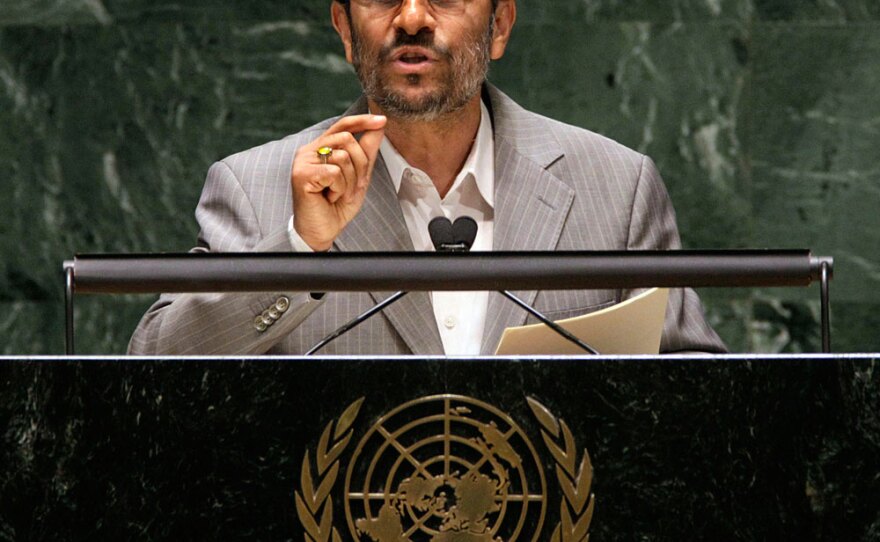Obama administration officials say they are determined to stop Iran from developing nuclear weapons, but they struggle to say how such a program can be disrupted.
Even administration critics disagree on what should be done in Iran.
Some experts favor military action. Others, while agreeing that bolder policies are needed, say the United States should focus first on changing the Iranian government.
How To Stop Iran?
The case for carrying out airstrikes on suspected Iranian nuclear facilities: A nuclear-armed Iran would so destabilize the volatile Middle East region that the use of force would be justified to block that development.
"I do think military attacks on the Iranian nuclear infrastructure may eventually be necessary to prevent Iran from possessing nuclear weapons," says Kori Schake, a research fellow at the Hoover Institution and a former foreign policy adviser to Sen. John McCain during his presidential campaign.
"And I think preventing Iran from possessing nuclear weapons is an enormously important national security goal for the United States," she adds.
Support for military action in Iran is especially strong within the so-called neo-conservative movement. But the "neo-cons" are not of one mind on the issue. Michael Rubin of the American Enterprise Institute is a case in point.
"I do consider myself a neo-conservative, and I very much supported the Iraq war," Rubin says. "However, Iran is a different case."
I do think military attacks on the Iranian nuclear infrastructure may eventually be necessary to prevent Iran from possessing nuclear weapons.
The 'Regime Change' Plan
Rubin worries about Iran developing a nuclear bomb, but he opposes using military strikes. Rubin says the best way to keep Iran non-nuclear is to push for a new government there.
"I very much support regime change in Iran, and military strikes on Iran would set back regime change," Rubin says.
Rubin points to Iran's Islamic revolutionary founder, Ayatollah Khomeini, who almost lost control of the country after the 1979 revolution. Khomeini consolidated power, Rubin argues, only after Iraq invaded Iran a year later. At that point, Iranians rallied behind Khomeini. And if the U.S. were to attack their country, Rubin says, the Iranians would rally behind their government again.
"Anyone who says that the Iranian people might rise up and support bombing their country has never been to Iran nor talked to Iranians," Rubin says.
Rubin spent five years in Iran doing research. He has a list of ways the United States could promote "regime change" that includes supporting independent trade unions, setting up a clandestine communication system and recruiting defectors.
"We don't know where the chips will fall if everything collapses," Rubin says. "But we should at least have a discussion first about where we would like to see Iran, and then walk backwards from that in policy to determine what we can do to sort of push and nudge the Iranian people and any post-Islamic republic government in that direction."
Rubin argues that a new government in Iran would be more trustworthy and more likely to trade away its nuclear program in return for aid.
I very much support regime change in Iran, and military strikes on Iran would set back regime change.
Problems With The 'Regime Change' Plan
Thomas Carothers, a foreign policy expert at the Carnegie Endowment for International Peace, studies such efforts. With respect to Iran, he says there's one point to keep in mind: Regime change might not happen.
"I understand the impulse on the part of many people here in Washington now to say, 'We do need regime change in Iran. It would be a good thing,' " Carothers says. "But I'm cautious if we make that the basis of our policy and say our policy will only succeed if this occurs because, you know, there's strong evidence pointing to the fact that we don't always get what we want in that regard."
For example, the United States has been trying unsuccessfully to promote regime change in Cuba for 50 years.
Schake of the Hoover Institution has another objection to depending on regime change to reverse an Iranian nuclear weapons program. Even a more democratic government may not be able to move right away against the hard-line elements likely to control a bomb.
"They may need to shore up their right flank and continue their nuclear program for some period of time or even indefinitely, and that, too, will be a problem for us," Schake says.
Schake says she recognizes the dangers in the military option: that Iran would escalate the conflict, for example, and retaliate. There could be a wider war.
For his part, Rubin admits his regime change policy may not work either.
On one point everyone seems to agree: With Iran, there's no good option.
Copyright 2022 NPR. To see more, visit https://www.npr.org. 9(MDAzMjM2NDYzMDEyMzc1Njk5NjAxNzY3OQ001))







